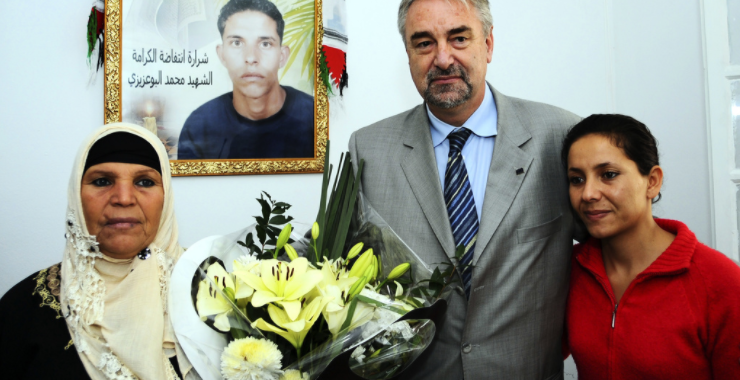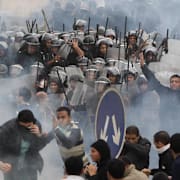
Systern till mannen som startade upproren: Fortsätt
När den tunisiske gatuförsäljaren Mohamed Bouazizi tände eld på sig själv den 17 december 2010 utlöste han den protestvåg i Nordafrika och Mellanöstern som kom att kallas den arabiska våren.
Tio år senare har Tunisien fått det bättre på vissa sätt och sämre på andra, säger Mohamed Bouazizis syster Leila Bouazizi, som nu bor i Kanada, till AFP. Landet har en ny grundlag och människor tillåts demonstrera – men högre priser, lägre inkomster och mörka framtidsutsikter även för högutbildade gör att situationen på sätt och vis är värre än före revolutionen.
– Många protesterar fortfarande för förändring. Det kan ta mer än tio år, men unga måste fortsätta att protestera, göra sina röster hörda, för att få sina rättigheter.
bakgrund
Arabiska våren
Wikipedia (en)
The Arab Spring (Arabic: الربيع العربي) was a series of anti-government protests, uprisings, and armed rebellions that spread across much of the Arab world in the early 2010s. It began in response to oppressive regimes and a low standard of living, starting with protests in Tunisia. From Tunisia, the protests then spread to five other countries: Libya, Egypt, Yemen, Syria, and Bahrain, where either the ruler was deposed (Zine El Abidine Ben Ali, Muammar Gaddafi, Hosni Mubarak, and Ali Abdullah Saleh) or major uprisings and social violence occurred including riots, civil wars, or insurgencies. Sustained street demonstrations took place in Morocco, Iraq, Algeria, Iranian Khuzestan, Lebanon, Jordan, Kuwait, Oman, and Sudan. Minor protests took place in Djibouti, Mauritania, Palestine, Saudi Arabia, and the Moroccan-occupied Western Sahara. A major slogan of the demonstrators in the Arab world is ash-shaʻb yurīd isqāṭ an-niẓām ("the people want to bring down the regime").The importance of external factors versus internal factors to the protests' spread and success is contested. Social media is one way governments try to inhibit protests. In many countries, governments shut down certain sites or blocked Internet service entirely, especially in the times preceding a major rally. Governments also accused content creators of unrelated crimes or shutting down communication on specific sites or groups, such as Facebook. In the news, social media has been heralded as the driving force behind the swift spread of revolution throughout the world, as new protests appear in response to success stories shared from those taking place in other countries.
The wave of initial revolutions and protests faded by mid-2012, as many Arab Spring demonstrations met with violent responses from authorities, as well as from pro-government militias, counter-demonstrators, and militaries. These attacks were answered with violence from protesters in some cases. Large-scale conflicts resulted: the Syrian Civil War; the rise of ISIL, insurgency in Iraq and the following civil war; the Egyptian Crisis, coup, and subsequent unrest and insurgency; the Libyan Civil War; and the Yemeni Crisis and following civil war. Regimes that lacked major oil wealth and hereditary succession arrangements were more likely to undergo regime change.A power struggle continued after the immediate response to the Arab Spring. While leadership changed and regimes were held accountable, power vacuums opened across the Arab world. Ultimately, it resulted in a contentious battle between a consolidation of power by religious elites and the growing support for democracy in many Muslim-majority states. The early hopes that these popular movements would end corruption, increase political participation, and bring about greater economic equity quickly collapsed in the wake of the counter-revolutionary moves by foreign state actors in Yemen, the regional and international military interventions in Bahrain and Yemen, and the destructive civil wars in Syria, Iraq, Libya, and Yemen.Some have referred to the succeeding and still ongoing conflicts as the Arab Winter. As of May 2018, only the uprising in Tunisia has resulted in a transition to constitutional democratic governance. Recent uprisings in Sudan and Algeria show that the conditions that started the Arab Spring have not faded and political movements against authoritarianism and exploitation are still occurring. In 2019, multiple uprisings and protest movements in Algeria, Sudan, Iraq, Lebanon, and Egypt have been seen as a continuation of the Arab Spring.In 2020, multiple conflicts are still continuing that might be seen as a result of the Arab Spring. The Syrian Civil War has caused massive political instability and economic hardship in Syria, with the Syrian currency plunging to new lows. In Libya, a major civil war is ongoing, with Western powers and Russia sending in proxy fighters. In Yemen, a civil war continues to affect the country. In Lebanon, a major banking crisis is threatening the economy of Lebanon as well as that of neighboring Syria.
Omni är politiskt obundna och oberoende. Vi strävar efter att ge fler perspektiv på nyheterna. Har du frågor eller synpunkter kring vår rapportering? Kontakta redaktionen
